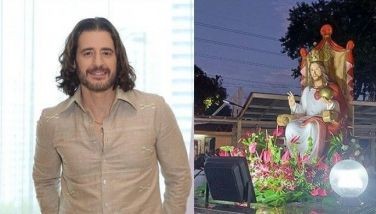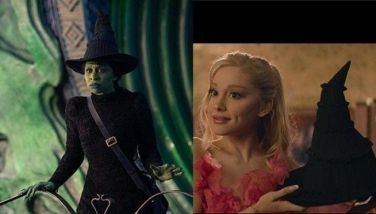Audie: You’re not too old to hope
November 20, 2005 | 12:00am
 Nine years after doing his last play for Repertory Philippines, theater stalwart Audie Gemora returns to the Rep stage as Don Quixote in the musical Man of La Mancha which started its regular run on Nov. 11 at Rep’s Globe Theater at Onstage in Makati. Audie, who devotes most of his time offstage managing the affairs of his two theater companies, Trumpets and Stages, says he couldn’t say no to Baby Barredo who directs the production.
Nine years after doing his last play for Repertory Philippines, theater stalwart Audie Gemora returns to the Rep stage as Don Quixote in the musical Man of La Mancha which started its regular run on Nov. 11 at Rep’s Globe Theater at Onstage in Makati. Audie, who devotes most of his time offstage managing the affairs of his two theater companies, Trumpets and Stages, says he couldn’t say no to Baby Barredo who directs the production.
"I remember being at Bibot’s (Zeneida Amador) death bed last year," says Audie. "She asked me and the others who were present to take care of Baby. So when she (Baby) called me one morning to alternate with Michael Williams in the lead role, I just couldn’t refuse and I agreed to attend rehearsals that same evening."
Besides, he says the material itself is irresistible. In the play within a play which takes place in a dungeon, an old nobleman Alonso Quijana and his squire Sancho Panza relive the days of knighthood and chivalry. Quijana believes he is Don Quixote, a knight who has a quest to "right the unrightable wrong" and "dream the impossible dream."
Audie is excited about his role as Quixote. "It’s made for a baritone which I am," he enthuses. "I haven’t used my voice in that manner in my whole career. My full baritone has not been fully utilized because my roles in the past have not required it. The closest was when I played Javert in Les Miserables. Coincidentally, Williams, the other Quixote, also played Javert in the Rep production.
Audie’s involvement with Rep dates back to 1978 when he was fresh out of high school. Rep was looking for young blood to fill some roles in A Chorus Line. As a student at the International School, he was very active in the choir and in school productions. The young actor passed the audition and became a member of the chorus but he didn’t stay in the background for long.
He remembers how he got his first lead role. "Miguel Faustmann was the lead in a Woody Allen play, Don’t Drink the Water. I had a supporting role. Miguel had told Bibot that he was going to miss one rehearsal to see a sick grandma. She found out later on that he had gone to the beach. So there was Bibot scolding Miguel in the elevator. I was looking on. Suddenly, Bibot grabbed the script from him and threw it to me. ‘You do the lead role.’"
For the next five years, Audie juggled theater and school (he was taking Communication Arts at De La Salle). He got positive reviews for his performances in Amadeus, Pippin, West Side Story and South Pacific. He did some 20 plays during his five-year stint with Rep.
Audie is all praises for Rep’s accomplishments. "I stand in awe at what Rep has done and at Bibot’s dedication to the craft, to build an industry. Rep was really prolific. During its busiest period, it was doing 10 plays a year plus two big musicals."
He credits Bibot for the company’s success. "It was Bibot who pursued her craft with great passion, making sure all the support was in place. She was always talking about forming an industry." He says that without Bibot, there would have been no Trumpets because it was her dedication to theater that inspired Audie and other ex-Rep performers to form their own theater groups.
After getting his college degree in 1983, Audie approached Amador and asked her for advice on what to do next. He was inclined to take a masters in theater but Amador had a different idea. She convinced him to take film courses in the US because she was going into movies. At that time, Sony and Amador were planning to produce digital films for theater exhibition.
Audie enrolled at New York University and earned his masters degree in 1986. When he returned, eager to apply what he had learned about film, he discovered that the project with Sony had fizzled out. Amador and Sony were ahead of their time.
Meanwhile, Audie didn’t want to revive his theater career. Instead he decided to join the mainstream. OPM was very in at that time. Theater friends like Raymond Lauchengco and Lea Salonga were doing concerts. And Freddie Santos was very busy directing concerts. So Audie signed up with Genesis, the management company of Gary Valenciano run by his wife Angeli.
Audie discovered a totally different world from theater. He had to unlearn many of the stuff he was used to in theater. Singing pop tunes is different from singing a Broadway melody. He was also more versed in English so he had to learn Tagalog, the type the masa understood. He recalls singing at a beer garden at SM North EDSA where the audience was noisy and shouted at you if they didn’t like you.
Eventually, Audie was able to make the transition to the mainstream and even hosted TV shows. He also recorded an album which meant he had to promote it going on provincial sorties, radio tours, mall shows and deal with the press. Audie even won an Awit award and he laughs when he tells me it was for Most Promising Singer. "I was already in my 30s.I had already been in the industry for 15 years and I get this award."
His experience in the pop world would serve him well when in 1991 he, together with friends decided to form Trumpets, a theater group that would devote itself to producing plays and musicals with a spiritual message. It was a marriage of mainstream and theater elements. The company was very marketing conscious and publicity driven. Later, he would form another outfit called Stages to handle corporate shows and productions not suited to Trumpets’ objectives.
His experience with the pop world helped him in making Trumpets a successful venture.
Audie’s priorities have changed since he and his associates decided to form Trumpets and Stages. "Any time on stage for me now is time off work. I feel like I’m responsible for bigger things. Managing the companies has eclipsed my need to act. I was already fulfilled in that area."
But his love for acting has never wavered even as he’s very selective when offers come along. Aside from his commitment to Rep, Audie liked the message of Man of La Mancha. "When a prisoner asks Cervantes, ‘Why don’t you see life as it is?’ the playwright replies, ‘I have seen life as it is. It’s cruel, it’s painful, it’s miserable. How can you tell me it’s sane? Is it really better to see the world the way it is or is it better to see it through a man who sees it with great hope?’".
Audie believes the musical sends a timely message in these difficult times. "How many Quixotes are out there? If you don’t have Quixotes, this country will never rise. You’re never too old to hope. Why does life change and make us jaded at one point? Why can’t we dream? Much like theater where there’s no money, it’s getting harder and harder to produce. But we won’t give up the dream. If we have to perform in the streets for free, we’ll do it."
Man of La Mancha is based on Miguel de Cervantes’ Don Quixote and was made into a popular Broadway musical by Dale Wasserman. This production is co-produced by Repertory Philippines with the Manila Symphony Orchestra under the baton of Prof. Toti Molina.
Audie alternates with Michael Williams in the role of Don Quixote, Menchu Lauchengco-Yulo plays Aldonza and Robbie Guevara plays Sancho Panza. Also playing key roles are Cocoy Laurel, Miguel Faustmann, Niccolo Manahan, Cathy Azanza, and Joy Virata. Flamenco artist Clara Ramona makes a special appearance in the musical. Other performances are on Nov. 25 and 28, Dec. 2, 3, 9, 10, 16 at 8 p.m. and Nov.26 and 27, Dec. 4, 18 at 3:30 p.m.
BrandSpace Articles
<
>
- Latest
- Trending
Trending
Latest
Trending
Latest
Recommended
November 26, 2024 - 12:00am




























